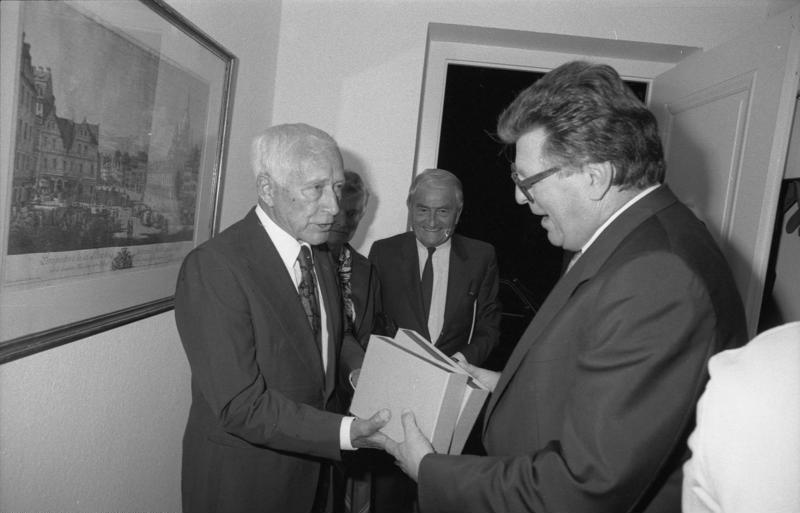
Ernst Jünger with Dr. Philipp Jenninger, CDU diplomat and president of the Bundestag, September 1986.
A two-year research project by the EU Commission to translate the travel writings of the author Ernst Jünger cost European taxpayers €200,371. The project discovered previously unearthed audio tapes of the famous German military philosopher that, once made public, will add value to Jünger’s highly esteemed oeuvre.
One of the leading lights of the post-1918 generation of German writers known as the “Conservative Revolution,” Jünger is regarded as one of the greatest right-wing intellectuals of the 20th century for his novel examination of life in a time of total war and rapid technological innovation.
The project titled “Ernst Jünger’s Intercultural Encounters” was conducted between 2012 and 2014 by the University of Bristol and focused on the translation of Jünger’s travel diaries made throughout his 103-year-long life. It was funded by the EU Commission’s Community Research and Development Information Service (CORDIS) and drew particular attention to Jünger overcoming “perceived cultural divides,” with specific focus on the German author’s travels in Brazil in 1936. Questions that guided the study were to what degree he qualified as a “postcolonial” author and how his travels contributed to his vision of Europe as a unit of multiple cultural identities—directives put forward in the 2014 grant objective:
The project will contribute significantly to one of the key developing strands of Jünger scholarship, the exploration of his decades-long inquiries into the mysteries of a world beyond rationalist and imperialist conceptions of centre and periphery. The project will show that, for Jünger, the existence of the cultural differences revealed so strongly in his travels is a mark of a liberal, ‘un-modern’ lifestyle, by which is meant a lifestyle not in thrall to material modernity. … The project will have implications for the definition of the European project‘s cultural dimensions. European integration—a key concern of Jünger’s—was, for Jünger, a way of safeguarding difference through the recognition of cultural identities under a stable intellectual and institutional roof.
A Heidelberg-born German war veteran, Jünger shot to fame for his 1920 memoir Storm of Steel which documented his trench experience while fighting on the Western Front. From there, he developed a controversial understanding of the transcendental qualities of modern warfare. Afterwards, Jünger was loosely implicated in the July 20th plot to murder Hitler and was a noteworthy conservative critic of the Third Reich.
Jünger’s worldview is often characterised as one that embraced the duality of technology and nature, advocating for a stoic acceptance of the struggles and contradictions of modern life while emphasising the individual’s quest for personal excellence and transcendence.
His post-war career included multiple science-fiction novels and experimentation with LSD, after which he developed his concept of the anarch, a form of individualism and self-mastery within a structured society, where individuals were encouraged to cultivate inner freedom and detachment from external systems of power.
Jünger died in 1998, after converting to Catholicism. He never disavowed any of his writings despite accusations that he was an intellectual precursor to fascism.
As part of the project, the research team contributed to a BBC documentary on wartime poets and conducted various seminars on Jünger’s life and work.
Despite none of the translations being publicly available, Dr. Christophe Fricker, an academic of German literature who led the project, spoke to The European Conservative about the value of Jünger’s contribution to European political philosophy.
In particular, Dr. Fricker stressed the discovery of extensive audio tapes of Jünger speaking about the impact of the fall of the Berlin Wall in 1989, as well as various topics of philosophical interest.
Perhaps relevant for the EU Commission, Jünger came to believe in the importance of a unified Europe as a counterbalance to the dominance of superpowers, envisioning a federation of nations that preserved their distinct cultural identities. He was, however, opposed to the centralisation of state power—describing it as corrosive to human dignity and the well-being of nations.
